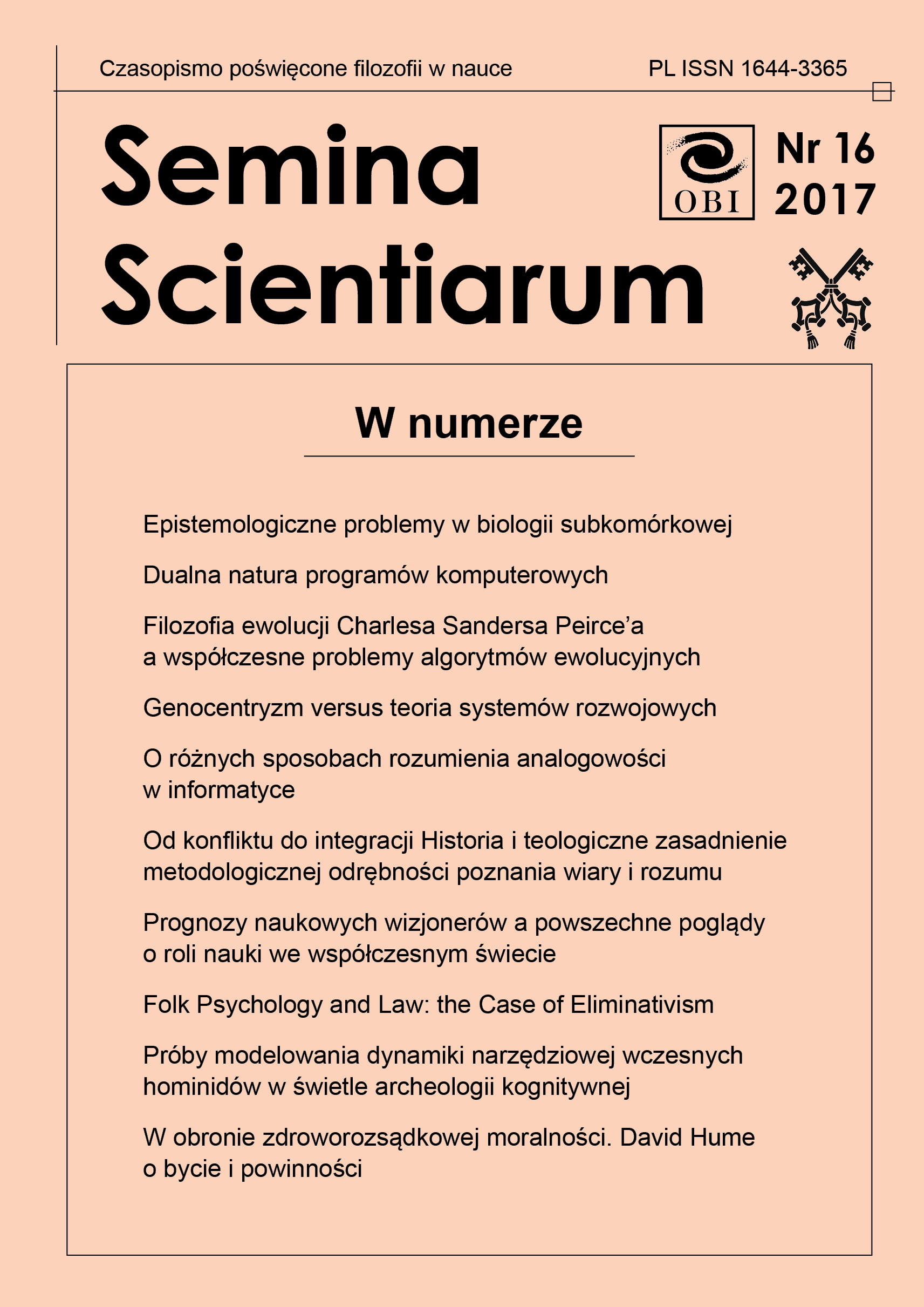In defense of common sense. David Hume on ‘Is’ and ‘Ought’
DOI:
https://doi.org/10.15633/ss.2491Słowa kluczowe:
Hume David, is, ought, common sense, ethical rationalism, Clarke Samuel, moral sentimentalismAbstrakt
In the article the author rejects traditional, logical interpretation of the famous
“Is-Ought Paragraph” from David Hume’s A Treatise of Human Nature.
He argues that most of the interpreters failed to grasp the wide philosophical
background of the IsOP, which is, generally speaking, a passionate discussion
between ethical rationalists and ethical anti-rationalists in the 17th and 18th
century British philosophy. The author shows that the Hume’s main aim in
the IsOP is to strengthen his previous arguments against ethical rationalism
and to reinforce (and not subvert at all) the common-sense (vulgar) systems of
morality, likewise he did in the first book of the Treatise… in case of the theory
of knowledge. The author argues that there is no putative thesis of logic in the
IsOP, which some scholars call “Hume’s Law”.
Bibliografia
Blackburn S., Hume on the Mezzanine Level, „Hume Studies” 19 (1993) no. 2,
s. 273–288.
British Moralists, ed. L. A. Selby-Bigge, New York 1964.
Botros S., Hume, Reason and Morality. A Legacy of Contradiction, London–
New York 2006.
Capaldi N., Hume’s Place in Moral Philosophy, New York 1989.
Capaldi N., Hume’s Rejection of ‘Ought’ as a Moral Category, „Journal of Philosophy”
(1966), s. 126–137.
Cohon R., Hume’s Morality. Feeling and Fabrication, Oxford 2008.
Darwall S., The British Moralists and the Internal ‘Ought’, Cambridge 1995.
Haakonsen K., The Science of a Legislator. The Natural Jurisprudence of David
Hume and Adam Smith, Cambridge 1981.
Hare R. M., Universalizability, „Proceedings of the Aristotelian Society”
(1954–1955), s. 303.
Hume D., A Treatise of Human Nature, ed. D. F. Norton, M. J. Norton, Oxford
Hume D., An Enquiry Concerning the Principles of Morals, ed. T. Beauchamp,
Oxford 1975.
Hume D., Essays, Moral, Political and Literary, ed. E. F. Miller, Indianapolis
Hume D., The Letters of David Hume, vol. r, ed. J. Y. T. Greig, Oxford 1932.
Korsgaard Ch., The Sources of Normativity, Cambridge 1996.
MacIntyre A., Hume on ‘Is’ and ‘Ought’, „Philosophical Review” 68 (1959),
s. 451–468.
Mackie J. L., Hume’s Moral Theory, London 1980.
Makowski P., Gilotyna Hume’a, „Przegląd Filozoficzny. Nowa Seria” 80 (2011)
nr 4, s. 317–334.
Załuski W., Błąd naturalistyczny, w: Studia z filozofii prawa, t. 2, red. J. Stelmach,
Kraków 2003.
Pobrania
Opublikowane
Numer
Dział
Licencja
Twórca oświadcza, że przysługują mu prawa autorskie do utworu i że nie są ograniczone w zakresie objętym niniejszym oświadczeniem oraz że utwór jest dziełem oryginalnym i nie narusza praw autorskich innych osób.
Twórca zezwala Uniwersytetowi Papieskiemu Jana Pawła II w Krakowie na nieodpłatne, niewyłączne i nieograniczone w czasie korzystanie z utworu, to jest:
- utrwalanie i zwielokrotnianie: wytwarzanie egzemplarzy utworu techniką drukarską, reprograficzną, zapisu magnetycznego oraz techniką cyfrową;
- obrotu oryginałem albo egzemplarzami, na których utwór utrwalono (wprowadzanie do obrotu, użyczenie lub najem oryginału albo egzemplarzy, publiczne wystawienie, wyświetlenie, a także publiczne udostępnianie utworu w taki sposób, aby każdy mógł mieć do niego dostęp w miejscu i w czasie przez siebie wybranym);
- włączenie utworu w skład utworu zbiorowego;
- udzielanie przez Uniwersytet Papieski Jana Pawła II w Krakowie sublicencji Creative Commons Uznanie autorstwa-Użycie niekomercyjne-Bez utworów zależnych 3.0 Polska
Uniwersytet Papieski Jana Pawła II w Krakowie udostępnia utwór na Platformie Czasopism należącej do uczelni, na licencji Creative Commons Uznanie autorstwa-Użycie niekomercyjne-Bez utworów zależnych 3.0 Polska. Tym samym uprawnia wszystkich zainteresowanych do korzystania z utworu pod następującymi warunkami:
- zostanie podany autor i tytuł utworu,
- zostanie podane miejsce publikacji (tytuł czasopisma i adres internetowy do oryginalnie opublikowanego utworu),
- utwór będzie dystrybuowany w sposób niekomercyjny,
- nie będą tworzone utwory zależne.

